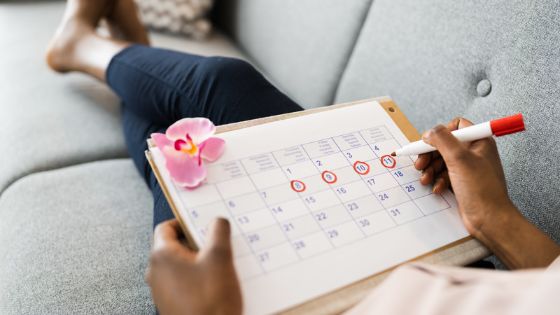My period is 3 days late; Should I be worried?

My period is 3 days late. Should I be worried? No, there is no need to be worried if your period is three days late. Although the menstrual cycle may differ from person to person, any delay beyond five days after its predicted date is generally considered a late period.
If you notice that your period has been absent for over a week, it's time to schedule an appointment with your doctor. They will be able to assess whether there are any underlying health concerns or if pregnancy could cause this irregularity.
What is a menstrual cycle?

A menstrual cycle is defined as the duration between one menstrual period when the following occurs.
Generally, most women experience a menstrual cycle of 28 days, but this may vary from individual to individual due to physical and genetic makeup.
Cycles can range between 21 - 35 days, during periods typically last 5 days. Yet it's normal for each period to fluctuate between 2 - 7 days!
If you notice that your menstrual period deviates from its typical timeline - mainly if the disruption occurs after 3 or 4 days of delay - it's essential to remain calm. However, before assuming anything, read this article for insight and guidance.
How many days is it normal to have a late period?
Though periods may not always occur at the same interval, if your cycle exceeds five days, you should seek medical attention for potential health issues or pregnancy. Also, contact a healthcare provider immediately if it has been more than a week since your last menstruation.
Remember that certain contraceptives, such as the contraceptive pill or IUDs, can affect your menstrual cycle. Book a visit with your gynecologist to address these worries and get tips for the most suitable solution.
For women with irregular menstrual cycles for varying reasons, we strongly suggest that they seek a gynecological consultation to explore potential treatment options and work towards stabilizing their periods.
Reasons for late or irregular periods
Unexpected and irregular menstrual cycles can be caused by a variety of factors, both mental and physical.
- Stress
- Excessive or sudden weight loss
- Adolescence and irregular periods
- Polycystic ovary syndrome
- Misuse of hormonal contraceptives
- Breastfeeding
- Infections and diseases
- Menopause or premature menopause
How can I prevent menstrual delay?
To help you manage and avoid missing a period, here are some suggestions on how to better monitor your menstrual cycle:
- Keep track of when your period starts and ends by marking it on a calendar. Phone apps can also help you keep track of this information. This information can help your gynecologist make a correct diagnosis, so we recommend you take the calendar to the doctor's office.
- Try to eat a healthy diet.
- Avoid excessive physical exercise to avoid stress and sudden weight loss.
- To ensure your sexual relationships are safe and healthy, always use contraception. Hormonal contraceptives can protect you from disease and help regulate your menstrual cycle - discuss the advantages and disadvantages with your gynecologist for more information.
- If you have had sexual activity, you should take a pregnancy test when your period is five days late or more to avoid anxiousness and mitigate any potential holds off with future menstruation. A swift answer will give you peace of mind and help ensure everything proceeds as generally as possible.
- If you're stressed, the best way to alleviate stress is to visit a therapist for specialized treatment.
Final words
If your menstrual period has been absent for over a week, it's time to schedule an appointment with your doctor. They will be able to assess whether there are any underlying health concerns or if pregnancy could cause this irregularity.
It's important to remember that late or irregular periods can occur due to various physical and mental factors. Tracking your menstrual cycle using apps, calendars, or even physical notes can help you recognize any changes in duration or pattern.
Additionally, always use contraception during sexual activity, as this is the best way to protect yourself from infections and unwanted pregnancies.
If you're worried about being late or having an irregular menstrual cycle, don't hesitate and make an appointment with your gynecologist!
They will be able to provide you with the best advice and answer questions regarding potential treatments. Remember that it's essential to remain calm, as panicking won't help you in any way. A visit to your doctor will ensure that everything is alright! Good luck!
DISCLAIMER: buildyourbody.org does not provide medical advice, examination, or diagnosis.
Medically reviewed and approved by Nataniel Josue M D.

